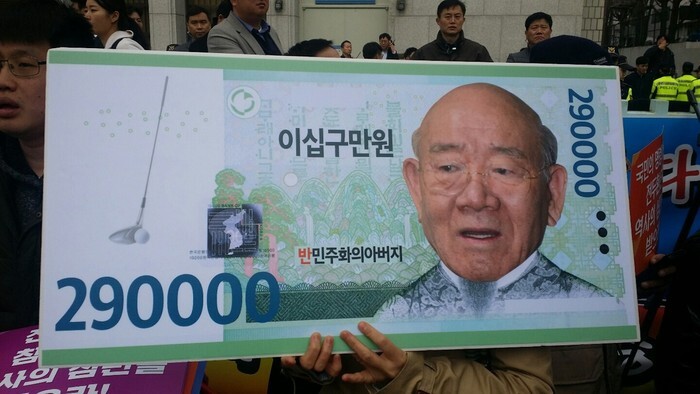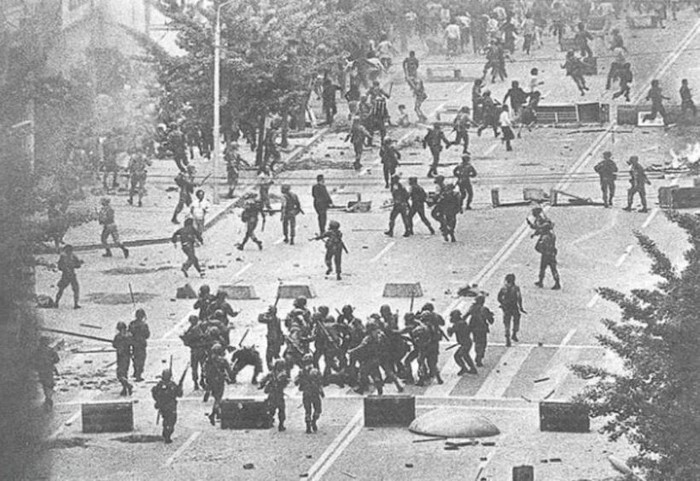hankyoreh
Links to other country sites 다른 나라 사이트 링크
Calls for investigation support team for Gwangju Democratization Movement

A May 18 Gwangju Democratization Movement investigation support team will need to be established among prosecutors if the May 18 investigation committee is to precisely determine the facts surrounding key issues related to the events, observers are arguing. Also likely to be needed is an amendment of the Special Act on the May 18 Gwangju Democratization Movement, etc. to stiffen punishments for those under investigation who refuse to comply or report for questioning.
Direct questioning of key military figures involved in the DEc. 12 coup and the suppression of the Gwangju movement such as former President Chun Doo-hwan will be needed if the investigation committee -- which began questioning on May 12 -- is to resolve key investigation issues related to the movement. But the investigation committee inaugurated in accordance with the special law (which was amended in May 2018) does not have the authority to conduct questioning by force.
An order of accompanying may be issued for questioning subjects who refuse to appear two or more times, but no means of forcibly apprehending them exists in the event that they refuse. Additionally, search and seizure warrants may only be requested from prosecutors in cases of clear risks such as evidence destruction -- a fact that appears very likely to impose limits on the questioning process.
In response, 18 Democratic Party lawmakers elected in Gwangju and South Jeolla Province in the 21st general elections recently announced plans to pursue an amendment to the special act that would broaden the role and authority of the investigation committee and increase punishments for distortions of the history of the Gwangju Democratization Movement. Under the current judicial system, the investigation committee does not possess the authority to request warrants itself. The Democratic Party is reportedly considering increasing the punishment for refusal to comply with the committee’s questioning to imprisonment.

Some are arguing that the special law should be amended to have prosecutors establish a May 18 Democratization Movement investigation support team to support the committee’s investigation. Their idea is that victims should be empowered to submit accusations to prosecutors and allow for forcible investigation in the event that the committee’s investigation uncovers additional confirmation of orders to open fire, massacres of civilians, and/or secret burials. But others are arguing that with the statute of limitations having already passed, an investigation premised on the possibility of punishment is out of the question under the current legal system.
“According to a Constitutional Court ruling, it is prohibited as a rule to enact legislation that results in a different legal effect from before after a legal relationship has ended in the past [true retroactive legislation],” explained Kim Jeong-ho, an attorney representing the plaintiffs in a case concerning Chun Doo-hwan’s memoirs.
“But since the importance achieved in terms of the public interest through an investigation of the May 1980 Democratization Movement could be viewed as overwhelming, it appears that it may be possible, and the statute of limitations can be excluded,” he added.
“We should discuss a plan that would allow prosecutors to investigate cases where victims submit complaints concerning individual issues such as the massacres of civilians during the events of May 1980,” he suggested.
By Jung Dae-ha, Gwangju correspondent
Please direct comments or questions to [english@hani.co.kr]

Editorial・opinion
![[Correspondent’s column] The real reason the US is worried about Chinese ‘overcapacity’ [Correspondent’s column] The real reason the US is worried about Chinese ‘overcapacity’](https://flexible.img.hani.co.kr/flexible/normal/500/300/imgdb/original/2024/0510/5217153290112576.jpg) [Correspondent’s column] The real reason the US is worried about Chinese ‘overcapacity’
[Correspondent’s column] The real reason the US is worried about Chinese ‘overcapacity’![[Editorial] Yoon’s gesture at communication only highlights his reluctance to change [Editorial] Yoon’s gesture at communication only highlights his reluctance to change](https://flexible.img.hani.co.kr/flexible/normal/500/300/imgdb/original/2024/0510/7717153284590168.jpg) [Editorial] Yoon’s gesture at communication only highlights his reluctance to change
[Editorial] Yoon’s gesture at communication only highlights his reluctance to change- [Editorial] Perilous stakes of Trump’s rhetoric around US troop pullout from Korea
- [Guest essay] Preventing Korean Peninsula from becoming front line of new cold war
- [Column] The state is back — but is it in business?
- [Column] Life on our Trisolaris
- [Editorial] Penalties for airing allegations against Korea’s first lady endanger free press
- [Editorial] Yoon must halt procurement of SM-3 interceptor missiles
- [Guest essay] Maybe Korea’s rapid population decline is an opportunity, not a crisis
- [Column] Can Yoon steer diplomacy with Russia, China back on track?
Most viewed articles
- 1Korea likely to shave off 1 trillion won from Indonesia’s KF-21 contribution price tag
- 2Nuclear South Korea? The hidden implication of hints at US troop withdrawal
- 3[Editorial] Perilous stakes of Trump’s rhetoric around US troop pullout from Korea
- 4With Naver’s inside director at Line gone, buyout negotiations appear to be well underway
- 5In Yoon’s Korea, a government ‘of, by and for prosecutors,’ says civic group
- 6[Column] ‘Choson’: Is it time we start referring to N. Korea in its own terms?
- 7‘Free Palestine!’: Anti-war protest wave comes to Korean campuses
- 8How many more children like Hind Rajab must die by Israel’s hand?
- 9Overseeing ‘super-large’ rocket drill, Kim Jong-un calls for bolstered war deterrence
- 10[Photo] ‘End the genocide in Gaza’: Students in Korea join global anti-war protest wave